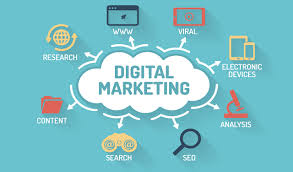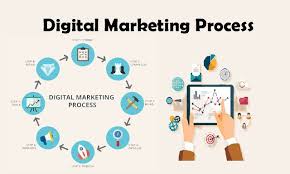The Power of Digital Marketing
In today’s fast-paced and interconnected world, digital marketing has emerged as a powerful tool for businesses to reach and engage with their target audiences. With the rise of the internet and social media, traditional marketing strategies have evolved to adapt to the digital landscape.
Digital marketing encompasses a wide range of tactics and techniques, including search engine optimization (SEO), social media marketing, email marketing, content marketing, and more. These tools allow businesses to connect with their customers in a more direct and personalised way than ever before.
One of the key advantages of digital marketing is its ability to reach a global audience. Unlike traditional forms of advertising, such as print or television ads, digital marketing campaigns can be targeted to specific demographics, interests, and locations. This level of targeting ensures that businesses can reach the right people with the right message at the right time.
Another benefit of digital marketing is its cost-effectiveness. Compared to traditional advertising methods, digital marketing is often more affordable and offers a higher return on investment. Businesses can track the performance of their campaigns in real-time and make adjustments as needed to maximise their results.
Furthermore, digital marketing allows for greater engagement with customers. Through social media platforms, businesses can interact with their audience in real-time, respond to feedback and inquiries promptly, and build lasting relationships with their customers.
In conclusion, digital marketing has revolutionised the way businesses promote their products and services. By harnessing the power of technology and data-driven strategies, businesses can expand their reach, increase brand awareness, drive sales, and ultimately achieve long-term success in today’s competitive marketplace.
Essential FAQs on Digital Marketing: Strategies, Benefits, and Trends
- What is digital marketing and why is it important?
- How can social media marketing help my business?
- What are the key benefits of email marketing?
- How does search engine optimization (SEO) impact digital marketing?
- What role does content marketing play in a digital marketing strategy?
- How can I measure the success of my digital marketing campaigns?
- What are the latest trends in digital marketing to watch out for?
- How can I create an effective digital marketing plan for my business?
What is digital marketing and why is it important?
Digital marketing refers to the use of online channels and digital technologies to promote products or services to a targeted audience. It encompasses various strategies such as social media marketing, search engine optimisation, email marketing, and content creation. Digital marketing is crucial for businesses in today’s digital age as it allows them to reach a wider audience, engage with customers in real-time, track campaign performance accurately, and drive measurable results. By leveraging digital marketing techniques effectively, businesses can increase brand visibility, generate leads, boost sales, and build lasting relationships with their customers. In essence, digital marketing is essential for staying competitive in the modern marketplace and achieving sustainable growth.
How can social media marketing help my business?
Social media marketing can significantly benefit your business by providing a platform to engage with your target audience, build brand awareness, drive website traffic, and generate leads. By leveraging social media platforms effectively, you can create meaningful connections with your customers, share valuable content, and promote your products or services to a wider audience. Additionally, social media marketing allows you to gather valuable insights into consumer behaviour, preferences, and trends, enabling you to tailor your marketing strategies for better results. Overall, social media marketing offers a cost-effective and powerful way to enhance your online presence and grow your business in today’s digital landscape.
What are the key benefits of email marketing?
Email marketing offers a multitude of key benefits for businesses looking to engage with their audience effectively. One of the primary advantages is its cost-effectiveness, as it allows businesses to reach a large number of subscribers at a relatively low cost compared to traditional marketing methods. Additionally, email marketing enables businesses to deliver personalised content directly to their subscribers’ inboxes, fostering a more targeted and tailored approach to communication. Moreover, email campaigns can be easily tracked and analysed, providing valuable insights into customer behaviour and preferences, which can inform future marketing strategies. Overall, the key benefits of email marketing include cost-efficiency, personalisation, measurability, and the ability to build lasting relationships with customers.
How does search engine optimization (SEO) impact digital marketing?
Search engine optimization (SEO) plays a crucial role in digital marketing by enhancing a website’s visibility and ranking on search engine results pages. By implementing SEO strategies such as keyword optimization, quality content creation, link building, and technical enhancements, businesses can improve their online presence and attract organic traffic to their website. A well-executed SEO strategy not only boosts a website’s search engine rankings but also increases its credibility and trustworthiness among users. Ultimately, SEO helps businesses drive targeted traffic, generate leads, and achieve better conversion rates, making it an integral component of any successful digital marketing campaign.
What role does content marketing play in a digital marketing strategy?
Content marketing plays a pivotal role in a digital marketing strategy by serving as the foundation for engaging and attracting target audiences. Through high-quality and relevant content, businesses can establish their authority, build trust with consumers, and drive valuable interactions. Content marketing not only helps in boosting brand awareness but also contributes to improving search engine visibility through SEO strategies. By creating compelling content that resonates with the target audience’s needs and interests, businesses can nurture relationships, generate leads, and ultimately convert prospects into loyal customers. In essence, content marketing acts as the glue that binds various digital marketing tactics together, forming a cohesive and effective strategy for long-term success in the digital landscape.
How can I measure the success of my digital marketing campaigns?
Measuring the success of digital marketing campaigns is crucial for evaluating their effectiveness and making informed decisions for future strategies. Key performance indicators (KPIs) such as website traffic, conversion rates, click-through rates, engagement metrics, and return on investment (ROI) can provide valuable insights into the performance of your campaigns. By tracking these metrics using analytics tools and platforms, businesses can assess the impact of their digital marketing efforts, identify areas for improvement, and refine their strategies to achieve desired outcomes. Regular monitoring and analysis of KPIs enable businesses to adapt to changing market dynamics and ensure that their digital marketing campaigns are delivering tangible results.
What are the latest trends in digital marketing to watch out for?
In the dynamic realm of digital marketing, staying abreast of the latest trends is crucial for businesses aiming to remain competitive and relevant. One frequently asked question pertains to the emerging trends in digital marketing that are worth monitoring. From the increasing emphasis on video content and influencer collaborations to the growing importance of voice search optimization and AI-driven personalization, these trends are reshaping the digital marketing landscape. By keeping a keen eye on these developments and adapting strategies accordingly, businesses can leverage these trends to enhance their online presence, engage with their target audience effectively, and drive sustainable growth in today’s ever-evolving digital ecosystem.
How can I create an effective digital marketing plan for my business?
Creating an effective digital marketing plan for your business involves careful strategizing and execution. Start by clearly defining your business goals and target audience. Conduct thorough market research to understand your customers’ needs and preferences. Identify the most suitable digital marketing channels, such as social media, email marketing, SEO, and content marketing, to reach your target audience effectively. Develop a cohesive strategy that integrates these channels to create a consistent brand message. Set measurable objectives and key performance indicators (KPIs) to track the success of your campaigns. Regularly analyse data and adjust your strategy as needed to optimise results and achieve your business objectives. By following these steps, you can create a robust digital marketing plan that drives growth and enhances your online presence.



